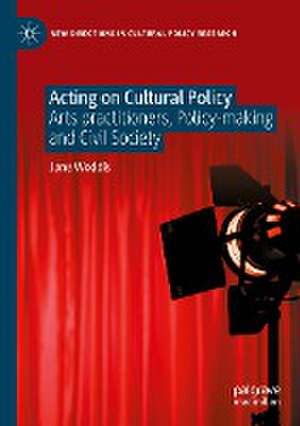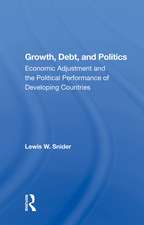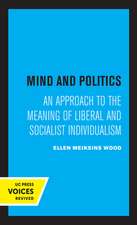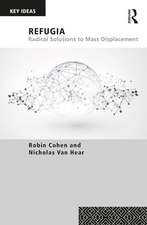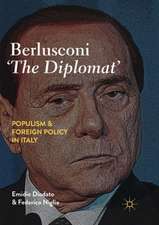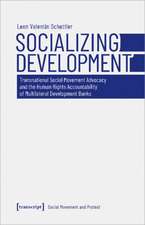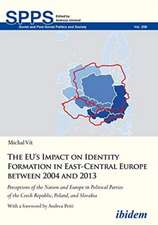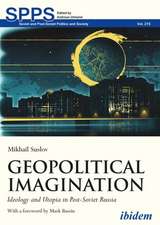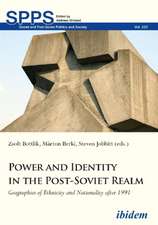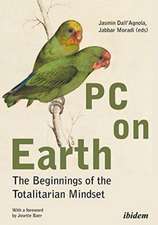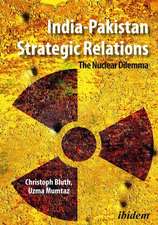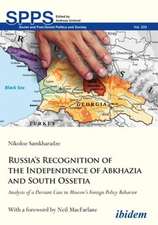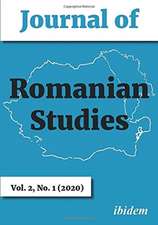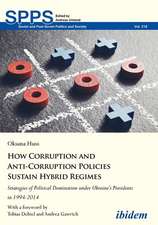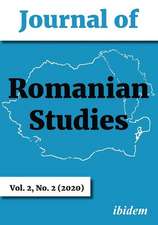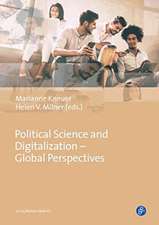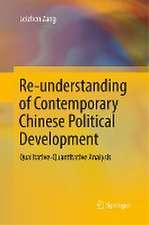Acting on Cultural Policy: Arts Practitioners, Policy-Making and Civil Society: New Directions in Cultural Policy Research
Autor Jane Woddisen Limba Engleză Paperback – 3 ian 2024
This book investigates the role of arts practitioners in cultural policy-making, challenging the perception that arts practitioners have little or no involvement in policy and seeking to discover the extent and form of their engagement. Examining the subject through a case-study of playwriting policy in England since 1945, and paying particular attention to playwrights’ organisations and their history of self-directed activity, the book explores practitioners’ participation in cultural policy-making, encompassing both “invited” and “uninvited” interventions that also weave together policy activity and creative practice. It discusses why their involvement matters, and argues that arts practitioners and their organisations can be understood as participants in civil society whose policy activity contributes to the maintenance and enlargement of democratic practices and values.
| Toate formatele și edițiile | Preț | Express |
|---|---|---|
| Paperback (1) | 722.43 lei 6-8 săpt. | |
| Springer International Publishing – 3 ian 2024 | 722.43 lei 6-8 săpt. | |
| Hardback (1) | 727.48 lei 6-8 săpt. | |
| Springer International Publishing – 2 ian 2023 | 727.48 lei 6-8 săpt. |
Din seria New Directions in Cultural Policy Research
- 20%
 Preț: 876.51 lei
Preț: 876.51 lei - 11%
 Preț: 508.17 lei
Preț: 508.17 lei - 15%
 Preț: 464.50 lei
Preț: 464.50 lei -
 Preț: 389.70 lei
Preț: 389.70 lei - 18%
 Preț: 725.92 lei
Preț: 725.92 lei -
 Preț: 382.75 lei
Preț: 382.75 lei - 15%
 Preț: 640.06 lei
Preț: 640.06 lei - 15%
 Preț: 640.55 lei
Preț: 640.55 lei - 15%
 Preț: 502.22 lei
Preț: 502.22 lei -
 Preț: 383.33 lei
Preț: 383.33 lei - 15%
 Preț: 527.66 lei
Preț: 527.66 lei - 15%
 Preț: 581.33 lei
Preț: 581.33 lei - 15%
 Preț: 527.97 lei
Preț: 527.97 lei - 18%
 Preț: 775.65 lei
Preț: 775.65 lei -
 Preț: 242.00 lei
Preț: 242.00 lei - 18%
 Preț: 892.74 lei
Preț: 892.74 lei - 18%
 Preț: 780.19 lei
Preț: 780.19 lei - 18%
 Preț: 893.71 lei
Preț: 893.71 lei
Preț: 722.43 lei
Preț vechi: 881.01 lei
-18% Nou
Puncte Express: 1084
Preț estimativ în valută:
138.23€ • 144.72$ • 114.38£
138.23€ • 144.72$ • 114.38£
Carte tipărită la comandă
Livrare economică 05-19 aprilie
Preluare comenzi: 021 569.72.76
Specificații
ISBN-13: 9783031111648
ISBN-10: 3031111648
Pagini: 226
Ilustrații: XIV, 226 p.
Dimensiuni: 148 x 210 mm
Greutate: 0.3 kg
Ediția:1st ed. 2022
Editura: Springer International Publishing
Colecția Palgrave Macmillan
Seria New Directions in Cultural Policy Research
Locul publicării:Cham, Switzerland
ISBN-10: 3031111648
Pagini: 226
Ilustrații: XIV, 226 p.
Dimensiuni: 148 x 210 mm
Greutate: 0.3 kg
Ediția:1st ed. 2022
Editura: Springer International Publishing
Colecția Palgrave Macmillan
Seria New Directions in Cultural Policy Research
Locul publicării:Cham, Switzerland
Cuprins
Introduction: Spear-carriers or Speaking Parts?.- Chapter 1: Arts Practitioners in Cultural Policy Research.- Chapter 2: A Brief History of Arts Practitioners in the Policy Process in Britain.- Chapter 3: A Framework for Participation: the Concept of Civil Society.- Chapter 4: Theatre Writing Policy in England Since 1945.- Chapter 5: Playwrights and Theatre Companies: New Playwriting Practice and Policy.- Chapter 6: New Playwriting: Networks of Policy and Practice.- Chapter 7: Conclusion: Putting Theatre Practitioners in the Spotlight
Notă biografică
Jane Woddis has worked professionally in the arts for many years and is an Associate Fellow in the Centre for Cultural and Media Policy Studies, University of Warwick, UK. She is co-editor of Artists' Narratives in Cultural Policy and Management Research, a special issue of the Journal of Cultural Management and Cultural Policy (2022).
Textul de pe ultima copertă
“Jane Woddis focuses upon arts practitioners’ involvement in cultural policy, situating her research problem within a general framework of theories of democratisation. Very few – if any – similar studies have existed until now. This is an impressive contribution to international cultural policy research.”—Professor Emeritus Per Mangset, University of South-Eastern, Norway
“This book intriguingly unpacks the multiple roles artists play in cultural policy-making. It illuminates the historical and contemporary involvement of theatre practitioners, and adds to much-needed conceptual knowledge about cultural workers’ self-organized policy contributions. Woddis offers an insightful read for our interdisciplinary community of cultural policy researchers.”—Dr Friederike Landau-Donnelly, Radboud Universiteit, Netherlands
“Woddis’s book is a rich, detailed, vivid account of a story that deserves to be much better known: the way playwrights have successfully organised to protect and improve their working conditions and, in the process, reshaped contemporary British theatre.”—Professor Dan Rebellato, Royal Holloway, University of London, UK
This book investigates the role of arts practitioners in cultural policy-making, challenging the perception that arts practitioners have little or no involvement in policy and seeking to discover the extent and form of their engagement. Examining the subject through a case-study of playwriting policy in England since 1945, and paying particular attention to playwrights’ organisations and their history of self-directed activity, the book explores practitioners’ participation in cultural policy-making, encompassing both “invited” and “uninvited” interventions that also weave together policy activity and creative practice. It discusses why their involvement matters, and argues that arts practitioners and their organisations can be understood as participants in civil society whose policy activity contributes to the maintenance and enlargement of democratic practices and values. Jane Woddis has worked professionally in the arts for many years and is an Associate Fellow in the Centre for Cultural and Media Policy Studies, University of Warwick, UK. She is co-editor of Artists' Narratives in Cultural Policy and Management Research, a special issue of the Journal of Cultural Management and Cultural Policy (2022).
“This book intriguingly unpacks the multiple roles artists play in cultural policy-making. It illuminates the historical and contemporary involvement of theatre practitioners, and adds to much-needed conceptual knowledge about cultural workers’ self-organized policy contributions. Woddis offers an insightful read for our interdisciplinary community of cultural policy researchers.”—Dr Friederike Landau-Donnelly, Radboud Universiteit, Netherlands
“Woddis’s book is a rich, detailed, vivid account of a story that deserves to be much better known: the way playwrights have successfully organised to protect and improve their working conditions and, in the process, reshaped contemporary British theatre.”—Professor Dan Rebellato, Royal Holloway, University of London, UK
This book investigates the role of arts practitioners in cultural policy-making, challenging the perception that arts practitioners have little or no involvement in policy and seeking to discover the extent and form of their engagement. Examining the subject through a case-study of playwriting policy in England since 1945, and paying particular attention to playwrights’ organisations and their history of self-directed activity, the book explores practitioners’ participation in cultural policy-making, encompassing both “invited” and “uninvited” interventions that also weave together policy activity and creative practice. It discusses why their involvement matters, and argues that arts practitioners and their organisations can be understood as participants in civil society whose policy activity contributes to the maintenance and enlargement of democratic practices and values. Jane Woddis has worked professionally in the arts for many years and is an Associate Fellow in the Centre for Cultural and Media Policy Studies, University of Warwick, UK. She is co-editor of Artists' Narratives in Cultural Policy and Management Research, a special issue of the Journal of Cultural Management and Cultural Policy (2022).
Caracteristici
Challenges the perception that arts practitioners have little or no effective involvement in cultural policy-making Provides a unique case study of playwriting policy in England that focuses on playwrights' organisations and their history of self-directed policy activity, and which has insights for other artforms and internationally Analyses arts practitioners' "invited" and "uninvited" interventions in policy, and sets them within a framework of theories of civil society
